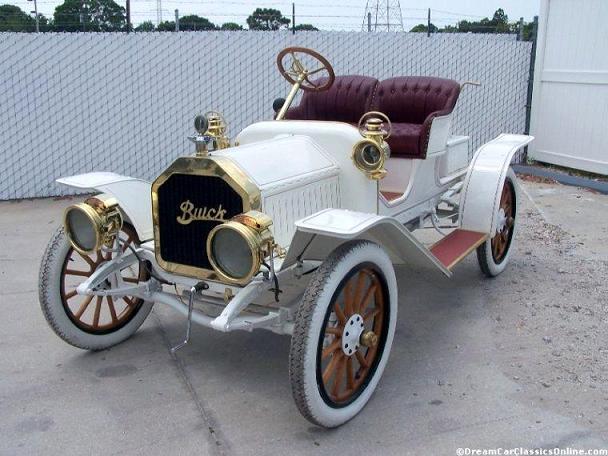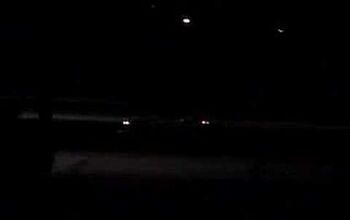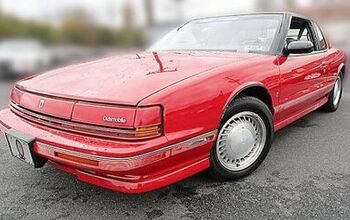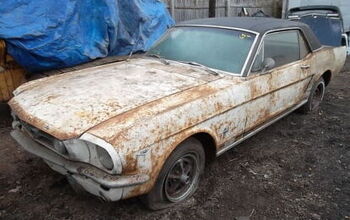Sunday Stories: "Turning Point" By Thomas Kreutzer
The first rays of the morning sun painted the predawn sky in glorious hues of orange and yellow as Bill stepped out of the house and took a deep breath of the cool pine scented air. He paused for a moment on his porch and took a sip of hot coffee from the large plastic travel cup he habitually carried when he had to be up early and surveyed the scene. To the East the Cascades rose up high and rugged against the sky, the sun on their far side striking a line of fire upon the barren rock at their uppermost rim, their flanks clad in a sea of evergreens split by the straight line of the occasional roadway and large barren squares where the loggers had been at work harvesting the bounty of the forest. As unsightly as the scarred tracts of land looked the trees would return in time, Bill knew. The mountains were eternal.
Stepping off the porch and heading across the yard, Bill avoided wetting his boots in the dew soaked grass by sticking to a series of stepping stones he had laid out years earlier. The morning air was cold, he noted, a sure sign that the long lazy days of summer had come to an end. Still, the air lacked the bite it would have once the damp Pacific Northwest winter set in and, while a Washington winter would never be as bitter cold as the ones he had experienced on the plains of North Dakota when he was in the Air Force, he was already dreading the constant dampness that the next few months would bring. One of these days, he thought, he and Eileen would finally buy an RV and follow their friends in their annual southward migration to warmer climates.
The series of paving stones led Bill unfailingly across the wet yard to the door of a large steel building. The building was only a couple of years old and was a drastic improvement over the tiny garden shed it had replaced. It was, he thought as he opened the door and flicked on the lights, just the kind of place a man needed when he had retired from a lifetime of work and study he thought as he unlocked the door and flicked on the lights. Eileen called the garage his man cave, but inside with the many long fluorescent lights shining so brightly, it seemed anything but cave-like to Bill‘s eyes. One corner was of the building was dominated by spotlessly clean work benches and perfectly organized boards hung with neat rows of tools. For comfort, there was an old bar stool to sit upon while he worked and Bill had covered the smooth cement floor in that area of the shop with the remnants of the well-worn shag carpet that had once been in their living room. Home made cabinets held many fine power tools and along the far wall of the space several shelving units held the many household odds and ends that were no longer needed but which still remained too precious to throw out.
In the opposite end of the space, however, close to the roll-up garage door, was something special. Bill’s own 1908 Buick Model 10. Its flawless white paint and polished brass fittings gleamed with a jewel like intensity under the bright overhead lights and its tall, upright shape spoke of a more genteel era now long past. Teddy Roosevelt had been in the Whitehouse when the car had left the factory, the Titanic was still on the drawing boards – its keel yet to be laid – and only five short years had elapsed since the Wright brothers had shocked the world with powered flight. Once at the very cutting edge of the industrial revolution, the car had endured almost the entirety of the twentieth century and had a sense of history that spoke to Bill as he too entered his golden years. As a former History professor, he understood the need to protect such things and knew too well what might be lost if people failed to act. If the stories of the car’s original owners had been lost to time, at the very least the car still carried their spirits, along with those of the men who had designed and built it. In their memory Bill had become the car’s caretaker, rescuing it from a barn in the fields of Eastern Washington. In time, his own work and theirs would merge, and together they would endure.
Bill pulled the chain that rolled open the tall garage door and then turned to the old Buick. From beside the car he reached up and set the accelerator lever on the old car’s wooden wheel and then moved to the front of the vehicle where the starting crank hung loosely beneath the polished brass radiator. He worked the lever around until it engaged the gear and then, placing his left hand on the front spring of the old car for leverage, gave the car a hard crank. The engine chuffed once as it turned over and failed to fire. Bill engaged the crank again and gave the car another hard kick. It chuffed again, once, twice and then wheezed to a halt. Again, repeated the process and the car responded by firing just briefly, running perhaps four or five complete revolutions, before finally stopping.
Moving to the steering wheel, Bill adjusted mixture and returned to the hand crank. Once, then twice he repeated the process until the old car finally barked and struggled into an unsteady idle. He paused for just a moment to catch his breath and then went back to the side of the car where he worked the levers on the wheel as the old Buick’s engine warmed and settled at last into a fine, even idle. It positively purred as it sat there, clicking and clacking like an ancient sewing machine, its fenders shivering in anticipation of the day’s adventure.
Clambering aboard the old car, Bill adjusted the accelerator lever and feathered the pedal that engaged the car’s forward gear. The ancient Buick sputtered just for a second under the load and then bumped forward, juddering off the cement floor through the door and out onto the gravel driveway. Safely outside, Bill brought the car to a stop, set the brake and climbed down. He went back into the garage where he took an old, full length duster down from a peg, gathered up a leather helmet with goggles and a pair of gauntlets before locking up the garage and returning to the car.
As Bill put on his coat, his wife Eileen emerged from the house wearing an ankle white length dress, a crocheted shawl and a floppy, wide brimmed hat set with roses that she had tied securely onto her head with a sheer white, silk scarf. Bill stopped to admire her as she made her way down the porch and glided angelically across the driveway, an apparition a hundred years in the making. She approached the left side of the car and he held her hand as she climbed daintily aboard and took her seat. After securing his helmet’s chin strap and putting on his gloves, Bill took the driver’s seat, worked the accelerator and set the car in motion as the sun crested the edge of the mountains and shone down on the earth below with the special golden light that seemed to be especially reserved for the finest of Autumn days.
The morning commute was beginning in earnest and Bill kept the old Buick the back roads in order to avoid the worst of the traffic. Given the fact that so many people in the Horseless Carriage Club were retired, he wondered why they always had to start out on their road rallies so early in the morning. Perhaps it was habit, he decided, people who had worked their entire lives were used to being up early. Fortunately, he thought, the old car was sophisticated enough to lope along at near 35 miles an hour and so, even if it wasn’t as fast as most of the road-ragers really wanted to run, no one could accuse him of being so slow as to present a real obstacle to their passage.
The couple worked their way down off the eastern edge of the Sammamish plateau and into the Snoqualmie valley below. It was foggy here and Bill wished he had thought to light the acetylene headlamps but with no place to safely stop on the narrow winding road, he knew he had to press on. Running ghostlike on the floor of the valley through the September fog without lights was a little disconcerting but they crossed the river and made the rendezvous without incident. Still, it was a relief when they finally pulled into the supermarket parking lot and stopped along the far edge where two or three other old cars already waited.
Bill made small talk with the other club members while Eileen and another lady went to a Starbucks coffee stand in the supermarket and brought back steaming cups of hot, bitter coffee. Then together, Bill and Eileen walked around and admired the other cars in the lot, stopping often to speak with arriving club members as more cars straggled into the lot one at a time. The sun rose higher into the sky, burning away the fog as its intensity grew and, by the time the last car arrived, it was a splendid fall morning that promised to grow into a golden day.
When the appointed time arrived, the drivers moved to the front of their cars and went through their normal start-up routines. The engines, already warm from the run to the meeting point, fired easily and the parking lot was soon filled with mechanical clatter and rich smelling exhaust smoke. As bystanders watched and waved, the cars worked their way into a loose line and headed out of the parking lot, turning North towards their intended goal still some hours away.
Despite their age, the caravan of cars moved along with little trouble. The rural roads’ low speed limits demanded that all cars, new and old alike, plod along at just 35 miles per hour so the convoy had little effect on the morning traffic. School busses were out and the motorists found themselves greeted with real gusto by the groups of children who lined the roads. An hour after they started, the group crossed over state route two and headed up into the high hills above the Snohomish Valley. Here the road dipped and turned but headed generally upward as they made their way into the Cascade foothills and, despite the low speed limit’s the drivers of the old cars noticed that people here were driving fast and hard. Everyone seemed to be in a rush and the group frequently had to pull up to allow cars to pass; their progress slowed.
By the time they reached Fitzgerald’s Storm Lake Grocery the group was exhausted from the stop and go pace. Bill and Eileen, who had arrived third at the meeting place, waited by their car while the others straggled in one at a time. It took time, and each drivers wore haggard, tired expressions as the pulled into to the parking area at the side of the store. Despite the group’s best efforts to stay out of people’s way car after car had honked horns and made dangerous passes in order to get through. Some people had even shouted unintelligible things as they had roared past. The whole county seemed to have suddenly gone nuts and the cheerful attitude that the group had started out with had all but evaporated
When the last car, a curved dash Oldsmobile, finally chuffed tiredly into the parking lot the group headed en-mass into the store. The clerk, a small Korean lady, glanced at them uncertainly as they entered the store dressed in their period costumes and then studiously ignored them as the poured their own stale coffee from the industrial size pot on the side counter. She seemed oddly reluctant to speak to them as she took their cash, preferring instead the small television that sat haphazardly upon the edge of the store counter.
Wondering what could be so important, Bill leaned over to look at the television and caught the image of a jet airliner smashing into a skyscraper as it flashed onto the screen. Close by, the building’s twin billowed a dark, greasy cloud of smoke while torrents of loose papers swirled about on the morning breeze. At the bottom of the television screen, a rolling ticker displayed the events of the morning in horrible detail while the newscasters struggled to describe the scene and speculated wildly about who must be behind it. The members of the group stood in stunned silence and watched as the scene unfolded again and again through the power of the instant replay. First one plane, then the next. The camera panned around to show fire trucks and once again focused on the twin tower as one of them crumbled slowly to the earth in a cloud of soot and debris. The announcer said something about the Pentagon and possibly another plane down somewhere in Pennsylvania. This could be no accident. America was under attack.
Bill’s blood ran cold. As a history professor he had studied these things, had spoken to people about where they had been on the 7th of December and remembered vividly where he was when they announced that President Kennedy had been shot. History was unfolding yet again and the events of this day too would demand that he remember where he was and what he was doing when he received the news. America had been attacked and he knew with absolute certainty that his country would strike back violently against those who were responsible. The nation would go mad. Blood demanded blood.
He turned quietly and stepped out onto the porch of the general store. Close by was a graffiti covered wooden bench and he sat on it and pondered the scope of what must surely come next. Lost in thought, he hardly registered Eileen’s arrival and they sat together, taking comfort from one another’s presence as they had so often before even as they were each lost to their own silent thoughts. One by one the other members of the group exited the store, fear or rage plain upon their faces, They went to their vehicles and, without waiting for the others, started their cars and headed without fail toward the South and their homes. The outing was obviously over and, as the final car departed Bill and Eileen finally stood and crossed the parking lot to where their own ancient, white Buick set gleaming in the morning sun.
Bill regarded the car as Eileen climbed aboard and waited for him to join her. The new century would be no different from the last, he thought sullenly and the car, he realized, had seen it all. It had plied the roads as Archduke Franz Ferdinand had been murdered and it had endured even as untold thousands died in the cold and mud of the trenches of World War One. The car had struggled through the Great Depression, witnessed ascent of Hitler and was hopelessly old when Japanese bombs had rained down on Pearl Harbor. It had sat alone and forgotten in a barn through the end of the war, through the dawn of the nuclear age, the Korean war, Vietnam and the even the moon landing. Its owners had spoken familiarly of Roosevelt, Taft, Wilson, Harding, Coolidge, Hoover, FDR, Truman, Eisenhower, Kennedy, Johnson, Nixon, Ford, Carter, Reagan, Bush, Clinton and now of George W Bush. Today, thought Bill, the old Buick had endured yet another of those moments.
The car started easily and Bill noted the worried expression on Eileen‘s face as he climbed aboard. Even as they sat there together, people were dying and the world was at the brink. Whoever was behind this would pay with their lives, he knew. Nations would fall, people would suffer untold hardship and the world would tear itself apart in an orgy of violence. The events of the day would live large in the memories of an entire generation.
He put the car in gear moved up to the roadway. In one direction, the road led South, back down from the mountains where home would be waiting and where the television would be running an endless loop of the day’s tragedy. In the other direction was the forest and the peace of eternal mountains. Beneath the hood, the engine of the old Buick beat steadily and the old car’s spirit spoke to him. History would happen, he realized, whether or not he watched. Reassured, he made his choice and set off.
Thomas Kreutzer currently lives in Buffalo, New York with his wife and three children but has spent most of his adult life overseas. He has lived in Japan for 9 years, Jamaica for 2 and spent almost 5 years as a US Merchant Mariner serving primarily in the Pacific. A long time auto and motorcycle enthusiast he has pursued his hobbies whenever possible. He also enjoys writing and public speaking where, according to his wife, his favorite subject is himself.
More by Thomas Kreutzer
Latest Car Reviews
Read moreLatest Product Reviews
Read moreRecent Comments
- Jalop1991 In a manner similar to PHEV being the correct answer, I declare RPVs to be the correct answer here.We're doing it with certain aircraft; why not with cars on the ground, using hardware and tools like Telsa's "FSD" or GM's "SuperCruise" as the base?Take the local Uber driver out of the car, and put him in a professional centralized environment from where he drives me around. The system and the individual car can have awareness as well as gates, but he's responsible for the driving.Put the tech into my car, and let me buy it as needed. I need someone else to drive me home; hit the button and voila, I've hired a driver for the moment. I don't want to drive 11 hours to my vacation spot; hire the remote pilot for that. When I get there, I have my car and he's still at his normal location, piloting cars for other people.The system would allow for driver rest period, like what's required for truckers, so I might end up with multiple people driving me to the coast. I don't care. And they don't have to be physically with me, therefore they can be way cheaper.Charge taxi-type per-mile rates. For long drives, offer per-trip rates. Offer subscriptions, including miles/hours. Whatever.(And for grins, dress the remote pilots all as Johnnie.)Start this out with big rigs. Take the trucker away from the long haul driving, and let him be there for emergencies and the short haul parts of the trip.And in a manner similar to PHEVs being discredited, I fully expect to be razzed for this brilliant idea (not unlike how Alan Kay wasn't recognized until many many years later for his Dynabook vision).
- B-BodyBuick84 Not afraid of AV's as I highly doubt they will ever be %100 viable for our roads. Stop-and-go downtown city or rush hour highway traffic? I can see that, but otherwise there's simply too many variables. Bad weather conditions, faded road lines or markings, reflective surfaces with glare, etc. There's also the issue of cultural norms. About a decade ago there was actually an online test called 'The Morality Machine' one could do online where you were in control of an AV and choose what action to take when a crash was inevitable. I think something like 2.5 million people across the world participated? For example, do you hit and most likely kill the elderly couple strolling across the crosswalk or crash the vehicle into a cement barrier and almost certainly cause the death of the vehicle occupants? What if it's a parent and child? In N. America 98% of people choose to hit the elderly couple and save themselves while in Asia, the exact opposite happened where 98% choose to hit the parent and child. Why? Cultural differences. Asia puts a lot of emphasis on respecting their elderly while N. America has a culture of 'save/ protect the children'. Are these AV's going to respect that culture? Is a VW Jetta or Buick Envision AV going to have different programming depending on whether it's sold in Canada or Taiwan? how's that going to effect legislation and legal battles when a crash inevitibly does happen? These are the true barriers to mass AV adoption, and in the 10 years since that test came out, there has been zero answers or progress on this matter. So no, I'm not afraid of AV's simply because with the exception of a few specific situations, most avenues are going to prove to be a dead-end for automakers.
- Mike Bradley Autonomous cars were developed in Silicon Valley. For new products there, the standard business plan is to put a barely-functioning product on the market right away and wait for the early-adopter customers to find the flaws. That's exactly what's happened. Detroit's plan is pretty much the opposite, but Detroit isn't developing this product. That's why dealers, for instance, haven't been trained in the cars.
- Dartman https://apnews.com/article/artificial-intelligence-fighter-jets-air-force-6a1100c96a73ca9b7f41cbd6a2753fdaAutonomous/Ai is here now. The question is implementation and acceptance.
- FreedMike If Dodge were smart - and I don't think they are - they'd spend their money refreshing and reworking the Durango (which I think is entering model year 3,221), versus going down the same "stuff 'em full of motor and give 'em cool new paint options" path. That's the approach they used with the Charger and Challenger, and both those models are dead. The Durango is still a strong product in a strong market; why not keep it fresher?





































Comments
Join the conversation
Because of the time difference, it was still pretty early in the morning out West when the attacks happened. I woke up to the news and like a lot of people was mesmerized by it. I had come back from Japan just a couple of months earlier and was working in the warehouse at a furniture store. About 7:30 I got a call that the owner had decided not to open that day and I realized that I could either sit in front of the TV all day or go find something to do. I had recently purchased the 200SX Turbo I have written about in the past and it was suffering from some small power steering leak so I decided I would work on that. The morning was just like I described, the start of a golden early fall day and while I was out under the Nissan, at some point in the morning, a whole convoy of old time cars rolled by. It was surreal and I realized that depending on when they started there would have been no way for them to know what was going on. I always wondered where they were and what went through their minds when they heard the news. One minute they were out enjoying themselves and the next that was over.
Well written as always Thomas ; On that fateful day I was readying my self for a trip to an abandoned Desert Junkyard for unobtanium vintage parts, I was up early when I heard the news on the radio as it happened . I immediately called my work mates & told them to switch on the Telly , I continued loading up and we spent the entire day in the Mojave Desert . I lost friends & family that day but not my rudder . Neither did you . Thanx for this story . Nate